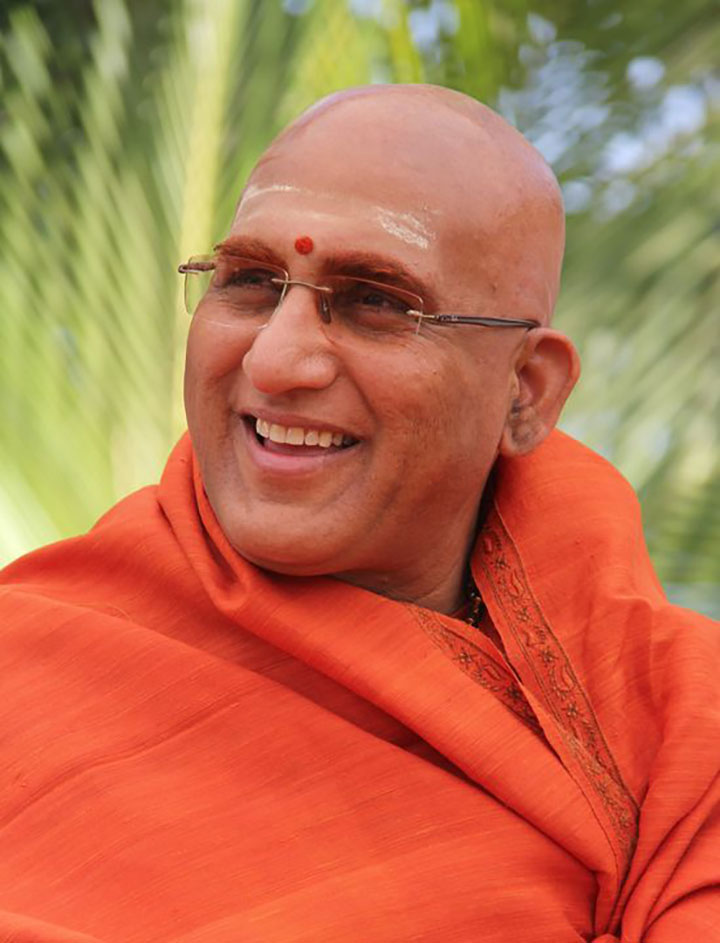For example, the rivers of Bharat aren’t just water bodies but vehicles of our cultural currents. Our religious bond with them lasts way beyond our physical lives. The practice of worshipping trees, rivers, ponds and wells is an essential part of our culture. It is only in Bharat that one associates divinity with Amla, Tulsi and Vat.
Since time immemorial, our religious beliefs and spiritual philosophies have provided us with a copious and expansive cultural identity.
Swami Avdheshananda Giri Maharaj
National security of any country has two major dimensions-internal security and external security. External security is dependent on Armed Forces and strategic martial policies. The stronger our Armed Forces and diplomatic fronts are, the more robust our external security shall be. But as far as internal security and unity of the nation are concerned, a national vision is essential. Such a comprehensive vision can only be found in the corridors of spirituality.
Bond with Bharat
Our Vedas are unparalleled and authentic sources of knowledge that speak at length on such concepts as the structure of a nation, national vision and Rashtra Dharma. In Rashtra Sukta nation is described as a divine entity. This implies that Bharat is not just a geographical landmass but a vivid manifestation of our cultural-spiritual consciousness and ideals. While it is true that India’s geographical structure is already quite godly and awe-inspiring, spiritual traditions of Bharat have further endeared it to the masses, making it all the more vibrant and majestic. From environment to our territorial expanse, every little detail of our national identity is ordered and shaped by our religious worldview. For example, the rivers of Bharat aren’t just water bodies but vehicles of our cultural currents. Our religious bond with them lasts way beyond our physical lives. The practice of worshipping trees, rivers, ponds and wells is an essential part of our culture. It is only in Bharat that one associates divinity with Amla, Tulsi and Vat.
Since time immemorial, our religious beliefs and spiritual philosophies have provided us with a copious and expansive cultural identity. For us, land is our mother. This feeling of motherly devotion towards our land and the sense of oneness with nature makes Bharat powerful, able and prosperous. Although Bharat today in independent in all manners and aspects, a few divisive forces are conspiring to divide us on the basis of jati and varnas. We have seen a lot of upswings and downturns since Independence. We have also withstood several external as well as internal assaults. However, on account of our spiritual sensibilities and thoughts, we’ve managed to stay united. For example, consider the Kumbh Mela. Even though we may seem different on the basis of caste and community, entire Bharat converges for holy dip on the banks of Ganga and Shipra.
Whatever systems we see in contemporary Indian society and the Hindu dharma, at their core lies the efforts of Bhagwan Shankaracharya – the resurrector of Sanatan Hindu dharma and the Vedic culture. Bhagwan Bhasyakar Shankaracharya Ji’s concept of Advait can be instrumental in unifying the entire world. His spiritual precepts constitute the core expressions of our national unity and cultural splendour. By establishing the chaar-dhaam in all the four expanses of our country-eastern, western, northern and southern – he has strung all of Bharat together in one unbreakable thread. Bhagwan Badri ji, seated as he is on the Uttarang peak of Himalayas in the North, is worshipped by Namboodiri Brahmans of the distant state of Kerala in South. Seeking fulfilment of their spiritual journeys, devotes from Kerala, Karnataka, Tamil Nadu, Assam and Bengal flock to Haridwar and Uttarakhand. Put plainly, not only are our religious and cultural traditions relevant in every context and area – providing fulfilment to our religious belief and rituals – but their faithful observance strengthens our social and national unity as well.
Fillip to Swadeshi
Similarly, spiritual traditions and festivals play an important role in the economic growth of our country too. And commitment to our nation, that springs forth from our spirituality and traditions, has nourished our idea of Swadeshi.
While celebrating religious festivals and traditions, the entire country gets unified. The peculiarities of each festival, together with the variety of ingredients needed to observe them, bolster our sense of Swadeshi. For example, in every puja we observe the ritual of kalash sthapna for which an earthen-pots is needed. This entire process goes well beyond defending our religious beliefs; it also promotes Swadeshi products. These religious rituals go a long way in integrating the diverse communities of our country. Our national goal of self-reliance, which the use of Swadeshi products will eventually fulfil, will establish India as a truly prosperous nation. By asking the citizens to be ‘vocal for local’ our country’s visionary Prime Minister has devised the surest formula for promotion of Swadeshi.



